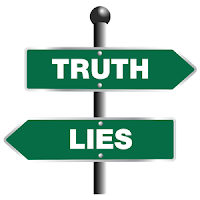The other day I was listening to the radio when I heard a song with the recurring refrain, “Truth be told, the truth is rarely told.” For those not familiar with this tune, these words aren’t a musical critique of today’s media. Nor is it a song about politicians, although for some it might ring true for that arena.
Actually, the song by Matthew West is a comment about the Church. Founded by the One who declared Himself to be “the way, the truth and the life” (John 14:6), it should be the one place where truth is paramount, where its members can be honest and feel the freedom to be open and candid with one another. Sadly, in many instances, it’s not.
Somewhere along the line, people have learned that they’re not supposed to tell how things truly are. We emerge from our cars in the church parking lot and spot someone we know who greets us with, “Hi! How are you?” We reply something like “Great!” or, “Couldn’t be better!” When in truth, we’re not be great, and things definitely could be a lot better.
It's because many of us have accepted the myth that if we’re followers of Christ, children of the King, life should be wonderful, problem-free. We dare not let anyone know our struggles, because if we do, what will they think of us? Strangely enough, those folks from whom we’re trying to shield our life’s challenges and hurts are probably trying to do the same with us. In actuality, we’re all a mess, in one way or another. But don’t admit it to anyone, okay?
A friend, Jimmy Lee, years ago wrote a book called Behind Our Sunday Smiles in which he addressed the facades we use to prevent people from peering inside and seeing our pain. His title captured it, because it’s like we hit a switch before entering the sanctuary or the Sunday school room. We’re convinced we need to look good, acting like we’ve got it all together – even if we’ve forgotten where we put it!
I’ve been guilty of this myself, understanding that when people ask, “How are you?”, they don’t always want an honest answer. They’re busy – we’re all busy – distracted, not wanting to get involved in one another’s lives, or just too weighed down with the burdens of everyday living. “Don’t tell me your troubles; I’ve got enough of my own.”
However, if we’re to be obedient to our calling as followers of Jesus, we have a responsibility to minister to one another. “Bear one another’s burdens, and thereby fulfill the law of Christ” (Galatians 6:2). And James 5:16 admonishes, “Therefore confess your sins one to another and pray for each other so that you may be healed.” We can’t do this very effectively if we’re not truthful with one another.
Even a casual glance affirms the Bible’s emphasis on truth. Speaking to a crowd eager to hear what He had to say, Jesus declared, “…If you hold to my teaching, you are really my disciples. Then you will know the truth, and the truth will set you free” (John 8:31-32). And the night He would be betrayed, He prayed to Jesus to His Father, “Sanctify them by the truth; your word is truth” (John 17:17).
This truth, ultimately, is the Gospel, that He came to become Savior and Lord to those who would receive Him, serving as the atoning sacrifice for our sins so we can be forgiven and reconciled to God. Working this out means we can respond in truth not only to God, but also to one another.
West closes his song with the reminder we can always be honest with God: “There’s no failure, no fall, there’s no sin You don’t already know, so let the truth be told.” We can be honest, totally vulnerable with the Lord because He know all about us.
And the Church – the body of Christ consisting of His children and followers – should be where He manifests His love, mercy, grace and compassion through each of us. As Ephesians 4:25 instructs, “Therefore each of you must put off falsehood and speak truthfully to his neighbor, for we are all members of one body.” The truth be told, the Church should be the one sure place where the truth is really told.






